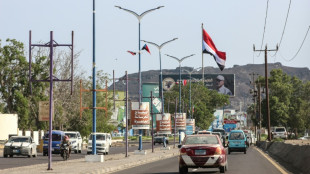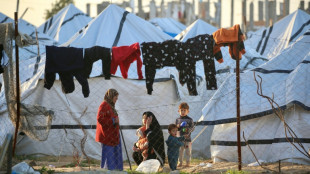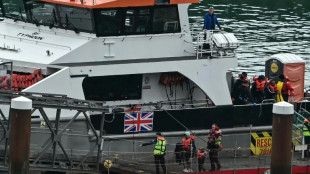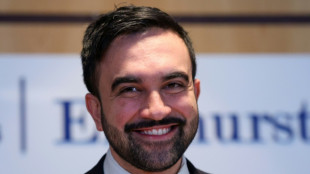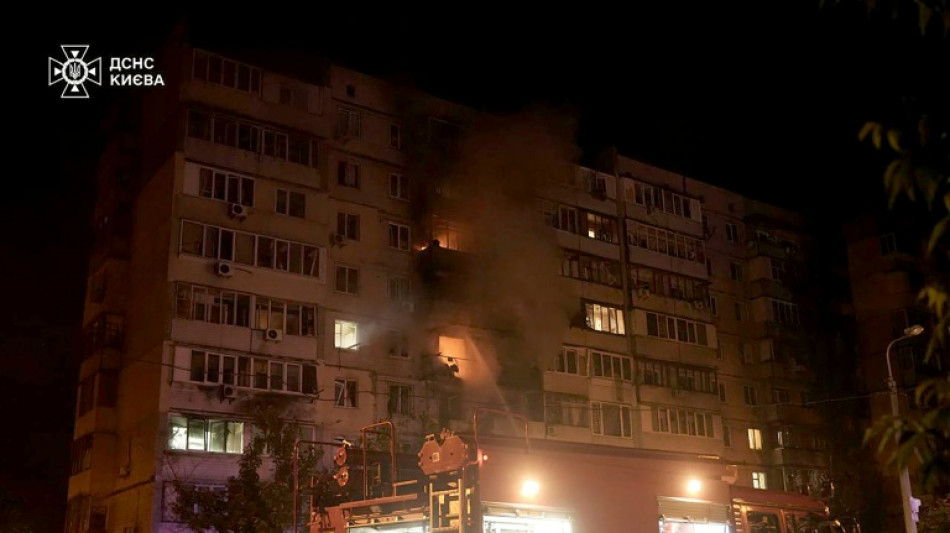
| SCS | 0.12% | 16.14 | $ | |
| RBGPF | -0.37% | 80.75 | $ | |
| NGG | -0.54% | 77.35 | $ | |
| BTI | 0.12% | 56.62 | $ | |
| CMSC | -0.15% | 22.65 | $ | |
| GSK | -0.53% | 49.04 | $ | |
| AZN | -0.63% | 91.93 | $ | |
| BP | -0.06% | 34.73 | $ | |
| RELX | -1.71% | 40.42 | $ | |
| RIO | -0.61% | 80.03 | $ | |
| BCE | 1.05% | 23.82 | $ | |
| CMSD | 0.09% | 23.15 | $ | |
| VOD | -0.15% | 13.21 | $ | |
| RYCEF | 0.13% | 15.51 | $ | |
| JRI | 0.22% | 13.61 | $ | |
| BCC | -0.26% | 73.6 | $ |
Russia strikes Kyiv after first stage of major prisoner swap

A massive Russian drone and missile attack on Kyiv Saturday wounded at least 15 people, just as Russia and Ukraine were in the middle of a major prisoner swap.
Ukraine's air force said Russia had launched 14 ballistic missiles and 250 attack drones in total overnight, adding that Kyiv was "the main target of the enemy attack".
Ukrainian Foreign Minister Andriy Sybiga said on X the barrage was "clear evidence that increased sanctions pressure on Moscow is necessary to accelerate the peace process".
Kyiv city officials reported fires and fallen debris in several parts of the Ukrainian capital, after AFP journalists heard explosions overnight.
The police said 15 people were injured in Kyiv and two more in the surrounding region.
Ukrainian presidential aide Andriy Yermak said Russia was "doing everything it can to prevent a ceasefire and continue the war".
The Russian military meanwhile said Ukraine had targeted it with 788 drones and missiles since Tuesday.
The attack on Kyiv came hours after Russia and Ukraine completed the first stage of a prisoner exchange agreed at talks last week in Istanbul which, if completed, would be the biggest swap since the start of the conflict.
Both sides received 390 people in the first stage and are expected to exchange 1,000 each in total.
Russia has signalled it will send Ukraine its terms for a peace settlement after the swap, which is set to continue over the weekend -- without saying what those terms would be.
- 'First stage' -
The two enemies have held regular prisoner swaps since Russia launched its 2022 offensive -- but none have been on this scale.
An AFP reporter saw some of the formerly captive Ukrainian soldiers arrive at a hospital in the northern Chernigiv region, emaciated but smiling and waving to crowds waiting outside.
After they stepped off the bus, tearful relatives rushed to embrace the soldiers while others held pictures of their loved ones, hoping to find out if they had been seen in captivity.
Many of the soldiers were draped in bright yellow and blue Ukrainian flags.
"The first stage of the '1,000-for-1,000' exchange agreement has been carried out," Ukrainian President Volodymyr Zelensky wrote on X.
Russia said it had received 270 Russian troops and 120 civilians, including some from parts of its Kursk region captured and held by Kyiv for months.
The two sides have not yet revealed the identities of those exchanged.
US President Donald Trump earlier congratulated the two countries for the swap.
"This could lead to something big???" he wrote on his Truth Social platform.
Trump's efforts to broker a ceasefire in Europe's biggest conflict since World War II have so far been unsuccessful, despite his pledge to rapidly end the fighting.
One of the soldiers formerly held captive, 58-year-old Viktor Syvak, told AFP it was hard to put words to his emotional homecoming.
Captured in the Ukrainian port city of Mariupol, he had been held for 37 months and 12 days.
"I didn't expect such a welcome. It's impossible to describe. I can't put it into words. It's very joyful," he said.
- Diplomatic push -
Several Ukrainians told AFP they were anxiously waiting to see if their relatives had been included in the swap.
"We have been looking for our son for two years," said Liudmyla Parkhomenko, the mother of a Ukrainian soldier who went missing during combat in the city of Bakhmut.
"Today I would like the Lord to send us good news... We feel in our hearts that he's alive," she added.
After more than three years of fighting, thousands of POWs are held in both countries.
Russia is believed to have the larger share, with the number of Ukrainian captives held by Moscow estimated to be between 8,000 and 10,000.
Diplomatic efforts to end the conflict have stepped up a gear in recent weeks, but the Kremlin has shown no sign it has walked back its maximalist demands for ending the fighting.
Russian President Vladimir Putin has defied European pressure for a full and unconditional truce in Ukraine, pressing on with its 39-month offensive, which has left tens of thousands dead.
D.Kaminski--GL

 London
London

 Manchester
Manchester
 Glasgow
Glasgow
 Dublin
Dublin
 Belfast
Belfast
 Washington
Washington
 Denver
Denver
 Atlanta
Atlanta
 Dallas
Dallas
 Houston Texas
Houston Texas
 New Orleans
New Orleans
 El Paso
El Paso
 Phoenix
Phoenix
 Los Angeles
Los Angeles
